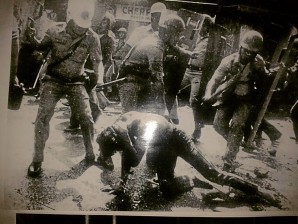Rights compensation board vows to expedite processes for martial law victims

THIS PHOTO of police brutality on protesters is among those displayed in the exhibit, “Himagsik at Protesta,” put up by Karapatan at the University of the Philippines Library until Sept. 21 for the 40th anniversary of the declaration of martial rule. PHOTO REPRODUCTION BY TONETTE OREJAS
MANILA, Philippines–Forty-two years after the declaration of martial law, a government agency leading the reparation efforts vowed “to tilt back the scales of justice” in favor of thousands who fell victim to martial law.
The Human Rights Victims’ Claims Board swore to uphold Republic Act 10368, or the Human Rights Victims Reparation and Recognition Act of 2013, a law recognizing and providing reparation to victims of human rights violations during Martial Law.
“The HRVCB commits to tilt back the scales of justice in favor of the victims by acknowledging the wrongs of the past towards healing the wounds of martial law,” the board said in a statement on Sunday, the 42nd anniversary of the declaration of Martial Law.
Under the law, around P10 billion has been set aside for the monetary remuneration of human rights victims during the Martial Law regime of the late President Ferdinand Marcos.
They have received 17,659 claims for reparation, from victims or their heirs, at the HRVCB office at the University of the Philippines and even at their five regional desks and across-the-country caravans.
These regional desks are at the Commission on Human Rights regional offices in Davao City, Cotabato City, Iloilo City, Legazpi City and Tacloban City.
HRVCB chairperson Lina Sarmiento said they would set up nine more regional desks to accommodate more claimants.
The filing of claims began on May 12 and is set to end on November 10. The board expects around 20,000 to 30,000 human rights victims to come forward to file their claims and tell their stories.
Sarmiento said the board’s implementing rules and regulations have emphasized a “liberal interpretation of the law in favor of facilitating the reparation and recognition of bonafide human rights violations victims or their legal heirs.”
“The HRVCB maintains its commitment to truth and justice,” Sarmiento said in the statement.
Using a standard point system, the board will determine the award of monetary reparation based on the type of human rights abuse committed, the frequency and duration of the violation, severity of harm and consequences.
This means that victims who suffered more would receive more points and if a victim is classified in more than one category of abuse, the victim will be awarded points from the higher category.
The HRVCB will be accepting claims until November 10, and is simultaneously evaluating, investigating and deciding on claims.
A preliminary list of legitimate claims will be published, after which appeals will be entertained and resolved by the board before it releases a final list of human rights victims who will be given monetary reparation.
The names of martial law victims will be included in the Roll of Victims of Human Rights Violations, their stories accessible to government agencies and other institutions.
This roll of victims will be enshrined in a memorial for the promotion of human rights “in order to prevent recurrence of similar abuses, encourage continuing reforms and contribute to ending impunity.”
“We want these lessons to serve as reminders to present and future generations that the freedoms and human rights we currently enjoy were borne from and nurtured by the sweat, tears and blood of those who fought against human rights abuses during the Marcos regime,” Sarmiento said.














